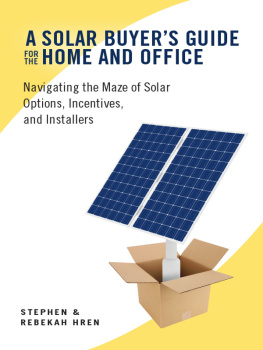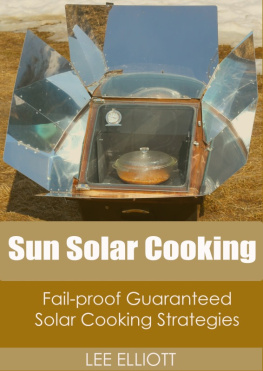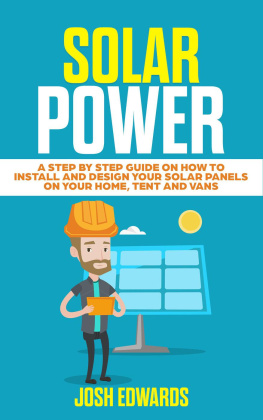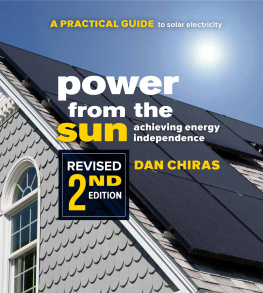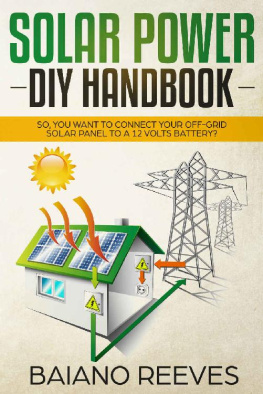ADVANCE PRAISE FOR
A Solar Buyers Guide
for the Home and Office
A Solar Buyers Guide for the Home and Office provides a detailed and clear overview of the many solar options available today to power and heat our homes and businesses. If you are confused about where to beginor whom to turn to for guidance and advicethis book is a great place to start. I highly recommend it.
GREG PAHL, author of The Citizen-Powered Energy
Handbook: Community Solutions to a Global Crisis
Once again, Stephen and Rebekah Hren have delivered an authoritative sourcebook.... [T]heir Solar BuyersGuide is a thorough, readable look at how we might turn to the sun to meet our energy needs. It delivers history, explains policy, and untangles the briar patch of the solar jungle. Thanks to this book, the path to sustainability is significantly less perilous: No machete required.
LYLE ESTILL, author of Small Is Possible
and Biodiesel Power
Need a clear guide to approaching solar-energy choices? Stephen and Rebekah Hrens new book will help you sift through the marketing hype and make sound decisions for your clean-energy future.
IAN WOOFENDEN, Senior Editor, Home Power magazine,
and author of Windpower for Dummies
Most people appreciate solar energymuch as they do motherhood and apple piebut many do not know about the practical everyday uses of solar power. While they grasp the simple concepts, they are commonly confused by the intricacies of buying solar electricity, heating, and hot-water systems. Hooray for this no-nonsense guide that makes this quagmire comprehensible!
JOHNNY WEISS, co-founder and Executive
Director, Solar Energy International


Navigating the Maze of Solar
Options, Incentives, and Installers
STEPHEN & REBEKAH HREN
CHELSEA GREEN PUBLISHING
WHITE RIVER JUNCTION, VERMONT
Copyright 2010 by Stephen and Rebekah Hren
All rights reserved.
No part of this book may be transmitted or reproduced in any
form by any means without permission in writing from the publisher.
Project Manager: Patricia Stone
Developmental Editor: Cannon Labrie
Copy Editor: Eric Raetz
Proofreader: Helen Walden
Designer: Peter Holm, Sterling Hill Productions
Printed in the United States of America
First printing September, 2010
10 9 8 7 6 5 4 3 2 1 10 11 12 13
Our Commitment to Green Publishing
Chelsea Green sees publishing as a tool for cultural change and ecological stewardship.We strive to align our book manufacturing practices with our editorial mission and to reduce the impact of our business enterprise in the environment. We print our books and catalogs on chlorine-free recycled paper, using vegetable-based inks whenever possible. This book may cost slightly more because we use recycled paper, and we hope youll agree that its worth it. Chelsea Green is a member of the Green Press Initiative (www.greenpressinitiative.org), a nonprofit coalition of publishers, manufacturers, and authors working to protect the worlds endangered forests and conserve natural resources. A Solar Buyers Guide for the Home and Office was printed on Joy White, a 30-percent postconsumer recycled paper supplied by Thomson-Shore.
Library of Congress Cataloging-in-Publication Data
Hren, Stephen, 1974
A solar buyers guide for the home and office : navigating the maze of solar options, incentives, and installers / Stephen and Rebekah Hren.
p. cm.
eBook ISBN: 978-1-60358-308-4
1. Ecological houses--Equipment and supplies--Purchasing. 2. Solar heating--Equipment and supplies--Purchasing. 3. Photovoltaic power systems--Purchasing. 4. Contractors--Selection and appointment. I. Hren, Rebekah, 1975- II. Title.
TH4860.H845 2010
697.78--dc22
2010026377
Chelsea Green Publishing Company
P.O. Box 428
White River Junction, VT 05001
(802) 295-6300
www.chelseagreen.com
Contents
INTRODUCTION
Why Solar Energy?
Truth is like the Sun. You can shut it out
for a time, but it aint going away!
ELVIS PRESLEY
Unless someone like you cares a whole awful lot,
nothing is going to get better, its not.
THE LORAX
We have come a long way over the last few centuries in creating a world with comfortable homes, amazing mobility, convenient appliances, and entertainment options galore. Our human energy and ingenuity has focused on methods and designs for restructuring the physical world to accomplish these ends; compared to a hundred or even ten years ago, we have succeeded beyond what anyone could have imagined. All manner and variety of food, music, art, and entertainment are available at our fingertips or a short journey away. Computers organize our lives and keep us in touch with old friends, freezers store our food, and heat pumps keep our homes temperate year-round. Every day new devices are invented that further increase our ability to create and consume.
What all our amazing accomplishments have not yet achieved is the widespread implementation of means to sustainably maintain our existence. Inarguably we are currently living unsustainably, utterly dependent on finite supplies of fossil fuels that pollute the earth to such a degree as to make it uninhabitable for our children and the millions of other species that call it home. We have reached a critical juncture where we need to turn the bulk of our attention from acquiring new devices that consume dwindling amounts of fossil energy to installing devices that produce renewable energy to power our lives.The health of our planet and the security of nations depend upon it.
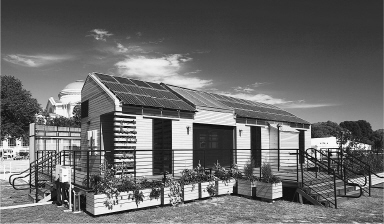
Figure 0.1. Almost all homes can utilize at least some solar power, and many have the potential to produce as much as or even more than they consume, like this 2009 Solar Decathlon home built by the University of Louisiana at Lafayette. PHOTO, JIM TETRO/DOE SOLAR DECATHLON.
How do we move from a civilization based on fossil fuels to one based on renewable energy? Fortunately, an answer to this vexing quandary rises every dawn. Solar power is a well understood, universally available source of energy that can provide nearly all of the energy you needmaking your office electronics whirr and hum, heating the water for your morning shower, warming the room youre now in. The technology to harness this amazing power has become increasingly efficient and sophisticated, to the point where installing at least one type of solar power system makes sense for almost every home and office. Solar power has both advantages and limitations, and well flesh these out in the next chapterbut suffice to say, this type of renewable energy should have a place in nearly all buildings.
History of Solar Power
The power of the sun has been used for millennia to heat homes and start fires, and for centuries to heat water and create electricity. From the bathhouses of Rome, to the layout of ancient Chinese towns, to the first commercial solar water heaters over a hundred years ago in Florida and California, solar power has successfully provided meaningful amounts of energy throughout history for the myriad folks who incorporated it into the design and function of their homes and cities. In ancient Greece, those who were ignorant of solar energy were considered barbarians and primitives. As the ancient Greek philosopher and playwright Aeschylus said:

